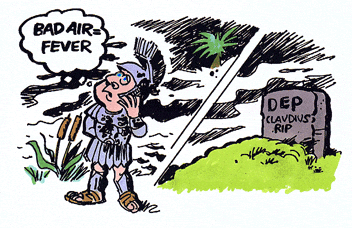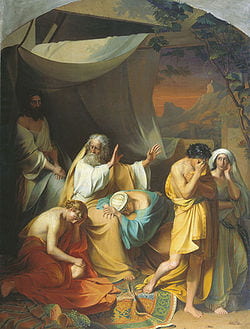Words With Totally Unexpected Origins
Between George Bush and the Internet, the English language is changing at an alarming rate. You won’t believe how far some words have come.
Nightmare

It seems as though it refers to a female horse, but in fact the “mare” part of the word “nightmare” (a terrifying dream) comes from Germanic legends, in which a “mare” is an evil female spirit or goblin that sits upon a sleeper’s chest, choking them and/or giving them bad dreams. The same Germanic word – “marōn” – gives rise to similar words in many Scandinavian and European languages. Interestingly, in Germanic legends, it was believed that this “mare” did more than just intimidate human sleepers. It was thought that it rode horses in the night, leaving them sweaty and exhausted the next day, and it even created chaos with trees, bending their branches.
Malaria

You wouldn’t have thought that a word we primarily associate with Africa would have originated in the slightly more forgiving climate of Rome. It comes from the medieval Italian words “mal” meaning “bad” and “aria” meaning “air” – so it literally means “bad air”. The term was used to describe the unpleasant air emanating from the marshland surrounding Rome, which was believed to cause the disease we now call malaria (and we now know that it’s the mosquitoes breeding in these conditions that cause the disease, rather than the air itself).
Sarcasm

Sarcasm originated from a Greek word (why Greek: because of lingua franca) sarkasmós, which initially means “to tear flesh,” “bite the lip in rage or sneer.” All these words rule the violent puzzle of physical power. Though, The origin of sarcasm was from the Greek language to finally Latin language. In the 16th century, the Latin language gave the word SARCASM and saved us all from the tongue twisters. The Danish Ambassador, very cleverly admired that sarcasm was actually brought to the UK by the Vikings. (The Vikings were seafaring Scandinavians engaged in exploring, raiding and trading in waters and lands outside of Scandinavia, from the eighth to eleventh centuries). The British language has a straight-to-your-face tone, which is the use of understatement and satire, and that is thought to have originated from the Vikings. The Vikings influenced the Britishers with the words and expressions they used. These words and phrases eventually became a part of their everyday language, also to be seen in some of the Logos and place’s names we use today, and ultimately in our caustic sense of humor.
Mortgage
Late 14c., from Old French morgage, literally “dead pledge,” from mort “dead” + gage “pledge.” So called because the deal dies when the debt is paid or when payment fails. And it seemeth, that the cause why it is called mortgage is, for that it is doubtful whether the feoffor will pay at the day limited such sum or not: and if he doth not pay, then the land which is put in pledge upon condition for the payment of the money, is taken from him for ever, and so dead to him upon condition, &c. And if he doth pay the money, then the pledge is dead as to the tenant, &c. [Coke upon Littleton, 1664]
Curse

Late Old English curs “a prayer that evil or harm befall one; consignment of a person to an evil fate,” of uncertain origin. It has no known relatives in Germanic, Latin, or Celtic languages. It is probably from Latin cursus “course” (see course (n.)) in the Christian understanding “set of daily ritual prayers” continued to “set of maledictions” as in the sentence of the great curse, “the formula read in churches four times a year, setting forth the various offenses which required automatic damnation of the offender; also, the damnation so commanded.” Connection with cross is strange. Another suggested source is Old French curuz “anger.”
Lemur

Nocturnal Madagascar mammal is given this sense by Linnaeus, from Latin lemures (plural, singular lemur) “evil spirits of the dead” in Roman mythology, a word of uncertain origin. De Vaan finds it likely that it and Greek lamia are borrowings of a non-Indo-European (perhaps Anatolian/Etruscan) word for malevolent spirits.
Kibosh:
 Another controversial term is “kibosh,” though most claim it can be traced back to Ireland, where a similar-sounding term referred to the so-called “the cap of death,” or the hat that judge would wear when sentencing someone to death. In 1836, kye-bosk, in British English slang phrase put the kibosh on, of unknown origin, despite intense speculation. The earliest citation is in Dickens. Looks Yiddish, but its original appearance in a piece set in the heavily Irish “Seven Dials” neighborhood in the West End of London seems to argue against this.
Another controversial term is “kibosh,” though most claim it can be traced back to Ireland, where a similar-sounding term referred to the so-called “the cap of death,” or the hat that judge would wear when sentencing someone to death. In 1836, kye-bosk, in British English slang phrase put the kibosh on, of unknown origin, despite intense speculation. The earliest citation is in Dickens. Looks Yiddish, but its original appearance in a piece set in the heavily Irish “Seven Dials” neighborhood in the West End of London seems to argue against this.

Hippocampus

The hippocampus is a small, curved formation in the brain that plays an important role in the limbic system. The hippocampus is involved in the formation of new memories and is also associated with learning and emotions. Because the brain is lateralized and symmetrical, you actually have two hippocampi. They are located just above each ear and about an inch-and-a-half inside your head. Speaking of origin of “Hippocampus”, it is the Greek word for a horse-fish hybrid. In classic mythology, these monsters were associated with Neptune. The hippocampus in your brain apparently looks like those sea creatures, which I guess means the hippocampus looks something like this;






